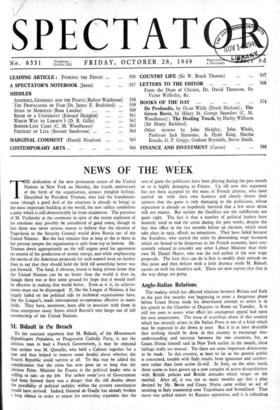NEWS OF THE WEEK
THE dedication of the new permanent centre of the United Nations in New York on Monday, the fourth anniversary of the birth of the organisation, arouses mingled feelings. Described by President Truman, who laid the foundation- stone (though a good deal of the structure is already in being) as the most important building in the world, the new edifice symbolises a unity which is still demonstrably far from attainment. The presence of M. Vyshinsky at the ceremony in spite of the recent explosion of his emotions may possibly be considered of good omen, though in fact there was never serious reason to believe that the election of Yugoslavia to the Security Council would drive Russia our of the United Nations. But the fact remains that as long as she is there in her present temper the organisation is split from top to bottom Mr. Truman dwelt appropriately on the still urgent need for agreement on control of the production of atomic energy, and while emphasising the merits of the American proposals for such control went no further than to say that they should hold the field till something better was put forward. The hard, if obvious, lesson is being driven home that the United Nations can be no better than the world it lives in, though there was at first some ground for hope that it would itself be effective in making that world better. Even as it is, its achieve- ments must not be disparaged. If, like the League of Nations, it has largely failed on the political side its technical organisations have, like the League's, made international co-operation effective in many fields. They have, moreover, been able to associate with them in these enterprises many States which Russia's veto keeps out of full membership of the United Nations.






































